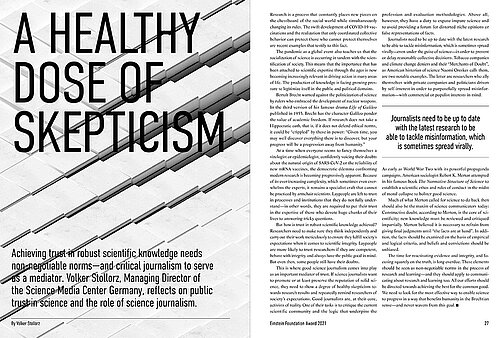
Achieving trust in robust scientific knowledge needs non-negotiable norms—and critical journalism to serve as a mediator. Volker Stollorz, Managing Director of the Science Media Center Germany, reflects on public trust in science and the role of science journalism.
By Volker Stollorz
Research is a process that constantly places new pieces on the chessboard of the social world while simultaneously changing its rules. The swift development of COVID-19 vaccinations and the realization that only coordinated collective behavior can protect those who cannot protect themselves are recent examples that testify to this fact.
The pandemic as a global event also teaches us that the socialization of science is occurring in tandem with the scientification of society. This means that the importance that has been attached to scientific expertise through the ages is now becoming increasingly relevant in driving action in many areas of life. The production of knowledge is facing growing pressure to legitimize itself in the public and political domains.
Bertolt Brecht warned against the politicization of science by rulers who embraced the development of nuclear weapons. In the third version of his famous drama Life of Galileo published in 1955, Brecht has the character Galileo ponder the value of academic freedom. If research does not take a Hippocratic oath, that is, if it does not defend ethical norms, it could be “crippled” by those in power: “Given time, you may well discover everything there is to discover, but your progress will be a progression away from humanity.”
At a time when everyone seems to fancy themselves a virologist or epidemiologist, confidently voicing their doubts about the natural origin of SARS-CoV-2 or the reliability of new mRNA vaccines, the democratic dilemma confronting modern research is becoming progressively apparent. Because of its ever-increasing complexity, which sometimes even overwhelms the experts, it remains a specialist craft that cannot be practiced by armchair scientists. Laypeople are left to trust in processes and institutions that they do not fully understand—in other words, they are required to put their trust in the expertise of those who devote huge chunks of their lives to answering tricky questions.
But how is trust in robust scientific knowledge achieved? Researchers need to make sure they think independently and carry out their work meticulously to ensure they fulfill society’s expectations when it comes to scientific integrity. Laypeople are more likely to trust researchers if they are competent, behave with integrity, and always have the public good in mind. But even then, some people still have their doubts.
Journalists need to be up to date with the latest research to be able to tackle misinformation, which is sometimes spread virally.
This is where good science journalism comes into play as an important mediator of trust. If science journalists want to promote or at least preserve the reputation of solid science, they need to show a degree of healthy skepticism towards research results and repeatedly remind researchers of society’s expectations. Good journalists are, at their core, activists of reality. One of their tasks is to critique the current scientific community and the logic that underpins the profession and evaluation methodologies. Above all, however, they have a duty to expose impure science and to avoid providing a forum for distorted niche opinions or false representations of facts.
Journalists need to be up to date with the latest research to be able to tackle misinformation, which is sometimes spread virally—even under the guise of science—in order to prevent or delay reasonable collective decisions. Tobacco companies and climate change deniers and their “Merchants of Doubt”, as American historian of science Naomi Oreskes calls them, are two notable examples. The latter are researchers who ally themselves with private companies and politicians driven by self-interest in order to purposefully spread misinformation—with commercial or populist interests in mind.
As early as World War Two with its powerful propaganda campaigns, American sociologist Robert K. Merton attempted in his famous book The Normative Structure of Science to establish a scientific ethos and rules of conduct in the midst of moral collapse to bolster good science.
Much of what Merton called for science to do back then should also be the maxim of science communicators today: Constructive doubt, according to Merton, is the core of scientificity; new knowledge must be reviewed and critiqued impartially. Merton believed it is necessary to refrain from giving final judgments until “the facts are at hand”. In addition, the facts should be examined on the basis of empirical and logical criteria, and beliefs and convictions should be unbiased.
The time for reactivating evidence and integrity, and focusing squarely on the truth, is long overdue. These elements should be seen as non-negotiable norms in the process of research and learning—and they should apply to communicating about research and learning too. All our efforts should be directed towards achieving the best for the common good. We need to look for the most effective way to enable science to progress in a way that benefits humanity in the Brechtian sense—and never wavers from this goal.

